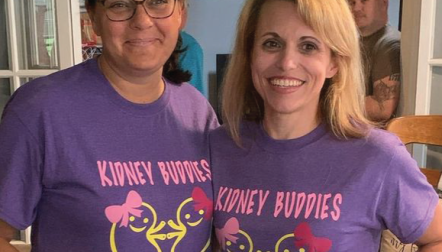
Blog post
Q&A with a nephrologist: How will kidney disease affect my life?

Please note: The American Kidney Fund (AKF) is committed to ensuring that every person receives health care that is fair, equitable and of the highest quality. The estimated glomerular filtration rate (eGFR) is an estimate of how well your kidneys are working. Currently the test considers your age, sex and race, among other things. A task force led by the National Kidney Foundation (NKF) and the American Society of Nephrology (ASN) has made recommendations to remove Black race as a factor in the eGFR calculation. The task force received input from patients, the community and kidney disease experts, including AKF's Medical Advisory Committee, to reduce bias in kidney function testing. AKF is reviewing the NKF-ASN recommendations and will update its outreach and educational programs ongoing as additional information and evidence evolves.
Learning you have kidney disease often leaves people with many questions. Dr. Delphine Tuot, an experienced nephrologist, answered questions about kidney disease from the AKF community. Here are some of the highlights from the webinar Q&A discussion.
I am newly diagnosed with kidney disease and am quite fearful. What are the most important things I can do to stop the progression of the disease?
The two most common causes of kidney disease are diabetes and high blood pressure. If you have either of those conditions, it is important to keep them under control to stop or slow the progression of your kidney disease. Taking your prescribed medicines, exercising regularly and eating healthy are great ways to manage diabetes and high blood pressure. Adding mindful and stress-reducing activities, such as meditation or yoga, to your daily routine could also help lower your blood pressure.
It is important to talk to all your doctors about your kidney disease, not just your nephrologist. This will help make sure any medicines or tests your other doctors are prescribing will not further damage your kidneys.
Will kidney disease prevent me from being active?
Many people with the early stages of kidney disease feel no symptoms, which means it should not affect your lifestyle or the activities you do. Your doctor will likely recommend that you stay active or take up new activities if you are currently more sedentary. You can start off with small steps to become more active if you are not already, including:
- Park farther away in parking lots to get in a few extra steps.
- Take your dog out for longer or more frequent walks.
- Play with your children or grandchildren.
- Take the stairs instead of the elevator. Even walking up one or two flights of steps and taking the elevator the rest of the way can be helpful.
What questions should I ask my nephrologist during my next visit?
Asking questions about your kidney health can empower you to be more engaged in your care. Bringing a checklist of questions to your next appointment can help you remember what to ask. Some suggested questions include:
- What caused my kidney disease and how can I prevent that underlying cause from getting worse?
- What is my eGFR and how much protein is in my urine? What do these results mean?
- What can I do to improve my kidney function?
- Can any of the over-the-counter medicines I am taking harm my kidneys?
- How can I make my treatments better fit my lifestyle?
If I do not stick to my recommended dialysis schedule and kidney-friendly foods, will that impact my health?
Not following your dialysis treatment schedule means your blood is not getting cleaned of toxins as it should be. This could be very harmful to your heart, brain and overall lifespan. You can work with your care team to figure out ways to get the treatment you need.
Eating kidney-friendly foods can be challenging for many people, but not sticking to your doctor's and dietitian's recommendations can cause buildups of nutrients in your blood. Too much potassium could cause heart attacks, while too much phosphorus could cause heart and bone disease. You can try keeping a food diary to document what you are eating and highlight your favorite foods. You can also check out the recipes, tips and tricks in the American Kidney Fund's Kidney Kitchen®, a one-stop-shop for people who want to take charge of eating healthy with kidney disease.
Watch our Kidney Chat: Audience Q&A with a Nephrologist webinar on-demand to learn more.


